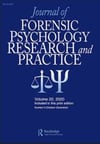An analyses of criminal responsibility evaluations by forensic evaluators in Missouri reveals that the outcomes of evaluations were consistent with similar research and over time. In addition, diagnoses of psychotic disorders were most highly associated with being found not criminally responsible, and the use of psychological testing in criminal responsibility evaluations has declined over time. This is the bottom line of a recently published article in the Journal of Forensic Psychology Research and Practice. Below is a summary of the research and findings as well as a translation of this research into practice.

Featured Article | Journal of Forensic Psychology Research and Practice | 2021, Vol. 21, No. 3, 283-300
Trends and Characteristics of Criminal Responsibility Evaluations in Missouri
Authors
Jason Lawrence, Missouri Department of Mental Health – The Center for Behavioral Medicine
Molly Persky, Missouri Department of Mental Health – The Center for Behavioral Medicine
Steven Mandracchia, Missouri Department of Mental Health – The Center for Behavioral Medicine
Abstract
Data collected by the State of Missouri Department of Mental Health were used to analyze trends and characteristics of criminal responsibility evaluations by Certified Forensic Evaluators in Missouri. Using data from Fiscal Year 2003 to Fiscal Year 2018, analyses focused on the following: (a) the relationship between diagnosis and criminal responsibility opinion, (b) the rates of criminal responsibility opinions over time (e.g., responsible vs. not responsible), and (c) the use of psychological testing instruments in these evaluations over time. Results indicated that outcomes of criminal responsibility evaluations in Missouri were broadly consistent with published literature. Diagnoses of psychotic disorders were the most highly associated with criminal responsibility opinions, the proportion of defendants being opined not criminally responsible was congruent with similar published samples and consistent over time, and the use of psychological testing appeared to decrease over time. In contrast with other published datasets, our sample had a disproportionately high number of evaluations deferring or providing no opinion to the question of criminal responsibility, and whether or not these entries were included in the analysis notably influenced our reported rate of finding defendants not criminally responsible. Reasons for this discrepancy, such as the preponderance of joint evaluations with competency to stand trial evaluations, as well as reasons for the decreasing trend in psychological test use, are discussed.
Keywords
Criminal responsibility, insanity, forensic psychology, forensic assessment
Summary of the Research
“Criminal responsibility (e.g., Not Guilty By Reason of Insanity or NGRI) evaluations are among the most challenging evaluations in which a mental health professional may partake…Compared to research on other psycho-legal evaluations…published literature on criminal responsibility evaluations is sparse…For the present study, we sought to focus on three important topics related to establishing standards of practice within the field: rates of insanity findings, the diagnoses most highly associated with opinions of legal insanity, and the use of psychological testing in these evaluations…” (p.283-284).
“…[The present study] sought to add to the body of literature by providing exploratory analyses of a comprehensive dataset complied by the Missouri Department of Mental Health over a 16-year period. The dataset consisted of evaluator-reported information regarding forensic psychological assessments, including criminal responsibility…The rate of evaluators opining a defendant not criminally responsible was broadly congruent with available literature. Approximately 10% of the evaluations pertaining to criminal responsibility provided an opinion of not criminally responsible, and this finding did not appear to change over time…In our sample, opinions of ‘Deferred’ or ‘Not Answered’ made up a substantial amount of the criminal responsibility evaluations (approximately 37%)” (p.287-292).
“Consistent with the extant literature, schizophrenia spectrum illnesses were the most highly associated with opinions of not criminally responsible…The relationship maintained when controlling for the potential influence of the defendant’s race and sex, as well as the use of psychological testing. The relationship between psychotic symptoms and opinions of criminal responsibility was further strengthened when analyzing the presence of psychosis regardless of diagnostic category, which resulted in 65% of defendants opined not criminally responsible being given a primary diagnosis involving psychotic symptoms…” (p.294).
“The use of psychological testing was not significantly associated with criminal responsibility opinion, including when controlling for the associations of diagnosis, race, and sex of the defendant…Our data, therefore, provide further evidence that the use of psychological testing for evaluations of criminal responsibility is not a standard expectation in the field…The most common criticism of the use of psychological testing for criminal responsibility evaluations is that testing is generally only a relevant indication of the test taker’s mental state at the time of the evaluation…” (p.295).
Translating Research into Practice
“We encourage further analysis of criminal responsibility evaluations from other datasets in different jurisdictions, as this will allow the published literature to better guide practitioners in gauging standards of practice. An increasingly robust availability of published data regarding forensic evaluations will allow practitioners to compare their own reports and evaluations with the field at large. The availability to compare one’s own work with the large-scale data would allow practitioners to notice discrepancies between their practice and the rest of the field, potentially illuminating biases or other unique differences that may influence their work…” (p.297-298).
“…Future research studies would also do well to include data regarding the proportion of joint evaluations in their sample, as well as details regarding the proportion of criminal responsibility evaluations not providing a yes-or-no opinion. Such details would allow for more accurate comparisons between jurisdictions and over time” (p.298).
Other Interesting Tidbits for Researchers and Clinicians
“One possible reason for the higher number of ‘Deferred’ or ‘Not Answered’ opinions in our sample is the high number of court orders requesting evaluations of court orders requesting evaluations of criminal responsibility jointly with an evaluation of competency to stand trial…Although joint evaluations are known to be common among criminal responsibility evaluations, the proportion of joint evaluations in our sample does appear somewhat large relative to other jurisdictions…” (p.293)
“Published literature has suggested academic analysis of joint competency and insanity evaluations should not be overlooked, as there may be key differences involving defendants, evaluation procedures, and opinions between joint evaluations and those conducted separately…A recent study suggested forensic evaluators were significantly more likely to opine a defendant insane when conducting joint evaluations as opposed to criminal responsibility-only evaluations…Different jurisdictions may have varying practices and conventions for the manner in which criminal responsibility evaluations are requested and completed, which in turn may influence the populations being evaluated for criminal responsibility in those jurisdictions” (p. 293).
Join the Discussion
As always, please join the discussion below if you have thoughts or comments to add!






















